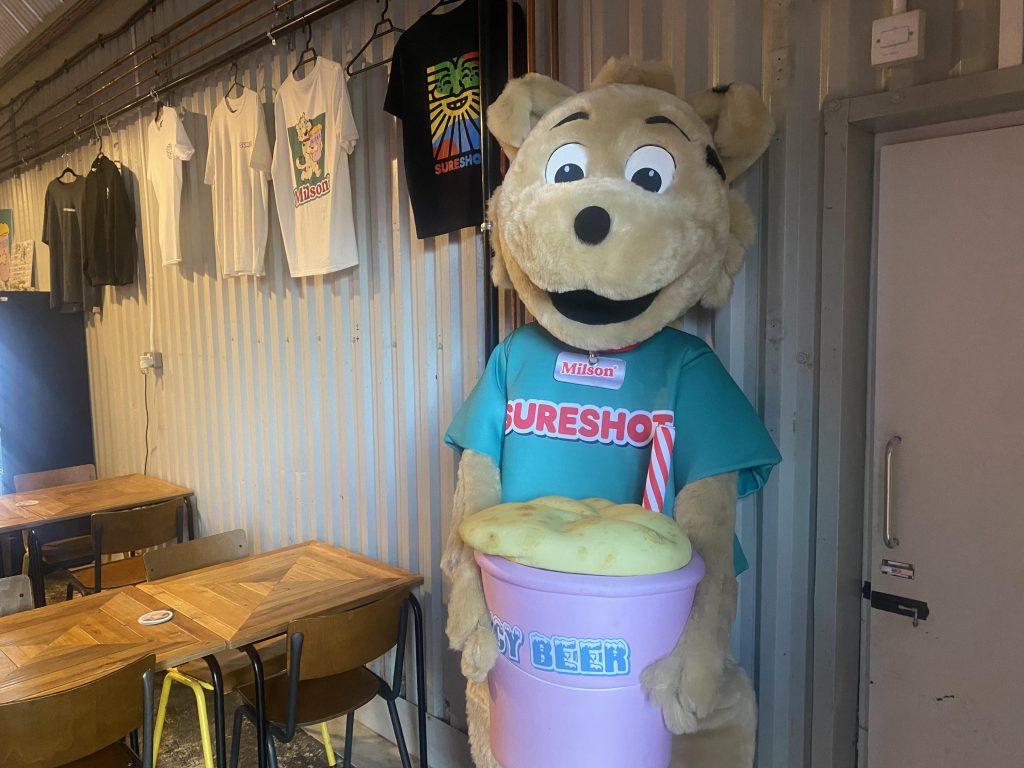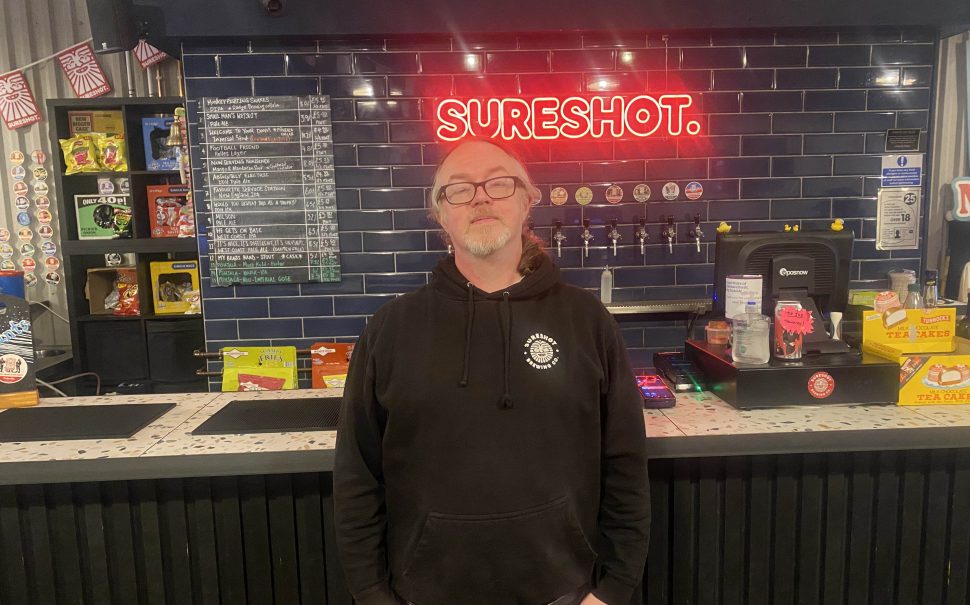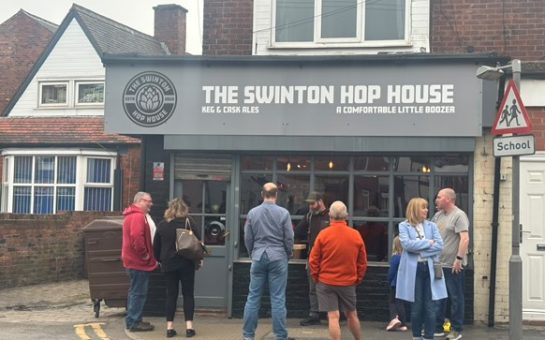If you’re a craft beer fan looking for more from your drink, then you may wish to check out Sureshot brewing.
Taking inspiration from brewing in the United States, the craft beer scene in the UK evolved in the 1990s and 2000s, pushing boundaries with a big focus on quality over quantity.
Whilst for centuries beer has connected people as a social ritual across the world, there is a desire amongst those on this cutting edge of beer-making to take it further, to continually innovate the brewing process, and root brewing in creativity and invention.
No one embodies this trend better than James Campbell, an innovator and aficionado of independent British craft beer.
I met with Campbell to learn about his journey from a young brewing assistant to big roles at influential breweries which have shaped British beer.
We talked at the Piccadilly Trading Estate where the brewery he co-founded, Sureshot, is located. But Campbell’s journey began as a part-time assistant in the 90s. He was known as “Cask Monkey Second Grade,” as he began to learn the art of brewing.
He recalls: “Three days a week I was washing and filling casks. Another couple of days I didn’t get paid for; I came in voluntarily to learn how to brew and do a lot more.
“When they realized they couldn’t do without me, they started paying me!”
James comes across as a humble guy – he is soft-spoken and unassuming, yet he also exudes a quiet confidence for his craft behind his gentle demeanour.
Campbell is perhaps most notable due to his past role as the head brewer at Manchester’s Marble Brewery for 13 years, where he played a pivotal role in Marble’s innovative beers. Under his influence, the brewery became known for bold, high-quality IPAs and other beers that challenged the status quo, earning a devoted following and critical acclaim.
Campbell’s next chapter took him to Cloudwater, a brewery synonymous with excellence in the world of craft beer. Campbell was instrumental in shaping Cloudwater’s output and his expertise helped the brewery achieve great success.
He told us: “I met with the original crew that set up Cloudwater. We spent a year planning that. When you think about that project, it was ambitious. We weren’t thinking little – it was like, we’re going to do this and go hard at it. And we did, and Cloudwater has been a phenomenal success. A trailblazer in the UK.”
This brings us to Sureshot, the brewery Campbell co-founded in the Piccadilly Trading Estate, just a stone’s throw from Cloudwater.

“I met Michael, who is my business partner. After a couple of years of planning, we got an opportunity halfway through the pandemic,” Campbell said. “Nobody knew what was going on. It was a horrible time for the industry. Some people were doing very well selling cans, others were closing their doors. It was a very uncertain world at the time. So we thought, what the hell – if we’re going to do something, let’s do it.”
The first project was a collaboration with Vocation Brewery to create a hazy double IPA, which even made its way onto Tesco shelves – a milestone for craft beer at the time.
“I can’t think of a better partner than Vocation,” Campbell told us. “Dom, the buyer at Tesco, was instrumental in making it happen. It was a great experience, and it resulted in a beer I’m really proud of. I think it was the first double IPA available in UK supermarkets. So, I was very happy with that beer.”
With Sureshot, Campbell continues to innovate, blending years of expertise with a relentless passion for crafting beers that resonate with drinkers and fans. I ask James what it is that has driven him to dedicate his decades-long career to craft brewing, and what it is that keeps Sureshot going.
“I mean, first and foremost, it’s a business. We have to make a living out of it. But what drives it is that you want to make people happy,” Campbell said. “Beer facilitates good times, celebrations and also the enjoyment of the product itself. There’s all kinds of beer for all kinds of occasions. We want people to talk about our beer, we want people to really actually enjoy it rather than passively enjoy it. We really enjoy beer, you know – we think we’ve got something great here.”
“I think that’s by and large what drives a large section of craft brewing. And people who socialise live longer!”
The craft beer industry isn’t an easy one to be in. The sector is affected by forces far beyond its control on the brewery floor. Anything from the large multinational breweries, shifting consumer habits, rising production costs, and economic instability make things harder and harder for independent breweries.
Navigating these challenges requires resilience; margins are razor-thin, and the interconnected nature of the economy means that even distant events can have a profound impact.
Campbell explains: “It’s really, really tricky, really, really tricky stuff. I mean, it is a tricky industry. The margins are, you know, very, very tight.”
“I think things like the war in Ukraine makes a huge difference. That affects grain prices. I mean, we’ve only managed to avoid a weak pound through everybody else’s currency being weak as well. Odd things like the strength of the mineral trade from Australia can affect the price of hops because it means their currency is strong. It would be fine if you didn’t want the hops, but we do!
“So, I guess from a socio-economic level, nobody’s an island. We’re not going to be exempt from the rules of other businesses. Any change in taxation, wages, it affects us.”
And to overcome this?
“First and foremost, the product has to be right. We work really, really hard on our product. We’ve got some excellent people. Being approachable is another thing. I think we’ve very much concentrated on who we are. Our branding is warm and embracing. We want to be as inclusive as we possibly can be.”
As our conversation comes to a close, it’s clear that Campbell’s passion for brewing is vibrant and pure. Whilst he is pragmatic about the difficulties and industry challenges, he doesn’t let it dampen his spirit. He acknowledges the strain of rising costs and the complexities of running an independent brewery, but it doesn’t hurt his commitment to the craft and its community.
Fundamentally, he is driven by a desire to make good beer.
“Beer-making, it’s not like being a nurse or a policeman,” he says. “It’s fundamentally frivolous. However, it does serve a function of making people happy.”
Sureshot taproom is located in the Piccadilly Trading Estate, and beer is available to order from their website.
All pictures taken by Thomas Brace.




